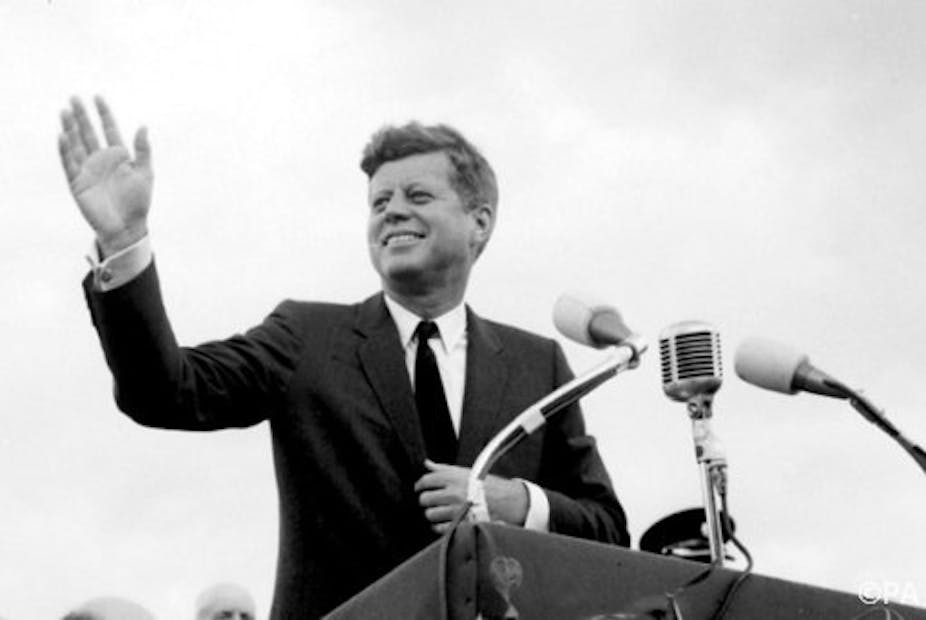Even though the assassination of John F Kennedy was the US’s fourth such loss, contemporaries talked of the end of national innocence. Looking back, 50 years on, perhaps what was so shocking was the killing of someone so youthful: Kennedy was the United States’ youngest elected president at 43 (Theodore Roosevelt was 42 when he succeeded McKinley in 1901), and he was only 46 when he died.
Kennedy and his wife, Jacqueline, were a handsome and elegant couple who seemed to symbolise the promise of a better future; this image had spread across the globe thanks to television. America’s loss seemed like a loss for the whole world.
In the afterglow of the 35th president’s tragic death, a now-familiar myth emerged: Kennedy as the golden leader of a modern-day Camelot, cut down in his prime and denied the chance to pursue new, more hopeful policies for the nation and the world.
And there was reason to be hopeful. Kennedy and his administration challenged segregation in the southern states, improved relations with Latin America through the Alliance for Progress scheme for aid in the region, adopted a resolute position in the Cuban missile crisis (Secretary of State Dean Rusk famously declared that they and Soviets had been eyeball to eyeball and the other guy had blinked) and secured passage of the Nuclear Test Ban Treaty in 1963.
But by the 1970s critical studies appeared, revealing a more complicated side of the man and his public career. The politician who emphasised his youthful energy suffered from multiple health problems; he was a serial adulterer; his domestic agenda of civil rights reform was more notable for rhetoric than for substantial achievements; he laid the foundations for US military intervention in Vietnam; and for all his talk of global peace, his taste for danger led him to take the world to the brink of nuclear obliteration in the form of the Cuban missile crisis.
But while Kennedy continues to divide historical opinion a half-century after his assassination, my judgment is broadly positive.
Ambition cut short
With his charm and good looks, wit and intelligence, Kennedy cut an impressive figure as president. This is evident in his televised press conferences; it also emerged in his speeches, which embodied an optimism about the problems of the age. He displayed a thoughtfulness and restraint in framing policies, and a capacity to learn from mistakes.
In domestic affairs his main goal was to improve civil rights for black Americans, but he was over-cautious, compromising more than was needed. He ought to have heeded the suggestion of Vice President Lyndon Johnson, who argued for a moral crusade (and ultimately, as Kennedy’s successor, helped lead one). Nevertheless, Kennedy deserves credit for taking important steps in what was a vicious atmosphere of anti-civil rights feeling in the southern states.
Kennedy’s principal focus was on foreign affairs, and his policies on Cuba and Vietnam are the most polarising part of his legacy. Was Kennedy’s handling of the crisis over Soviet nuclear weapons stationed in Cuba an example of cool crisis management? Or did he exaggerate the importance of Latin America, and Castro’s Cuba in particular, defusing a crisis largely of his own making? Kennedy deserves credit for resisting pressure to take military action, but he knew that his actions were only part of the crisis’s peaceful resolution. More important were America’s military superiority, the limited value to the Soviets of placing missiles in Cuba, and Moscow’s difficulty in justifying to the world the risk of nuclear conflict.
Meanwhile, most writers think that Kennedy’s actions and rhetoric worsened the situation in Vietnam and increased the likelihood of direct military intervention to help the South Vietnamese government. The number of US military advisers in Vietnam grew 20-fold during his presidency. Yet I share the doubts of Robert Dallek and Lawrence Freedman about whether Kennedy would have escalated the conflict, as Johnson went on to do.
Like taking a drink
Kennedy was wary of the military’s promises of easy successes, and he repeatedly rejected their requests for the dispatch of combat troops. As he said in November 1961: “It’s like taking a drink. The effect wears off, and you have to have another”. We will never know how he would have reacted to the circumstances Johnson faced in 1965, but it seems clear he would have regarded the military’s proposals with a more sceptical eye.
Kennedy certainly came into office on the back of tough anti-Soviet rhetoric, launching a programme of increased defence expenditure and adopting a resolute position over Berlin and Cuba. But at the same time, he worked for a thaw in relations. He favoured patience in negotiations, keeping cool in a crisis, wanted to avoid cornering any adversary, and appreciated the need to see issues from the perspective of the other side. Progress in East-West relations was limited, but he did secure signature of the Nuclear Test Ban Treaty.
Our time is far more cynical about public figures, especially about politicians, than the early 1960s, yet Kennedy’s lustre remains relatively intact, as the number of TV and radio programmes and newspaper articles about him testify. The reasons for this are elusive, but seem likely to owe something to his public persona. He benefited from his good looks and charisma, but there was substance behind the image.
For all his many failings, he was an impressive politician. His rhetoric sometimes set unrealistic objectives – his inaugural address announced that America would “bear any burden … to assure the survival and success of liberty” – but his words were deployed in the sincere pursuit of the most noble goals.

